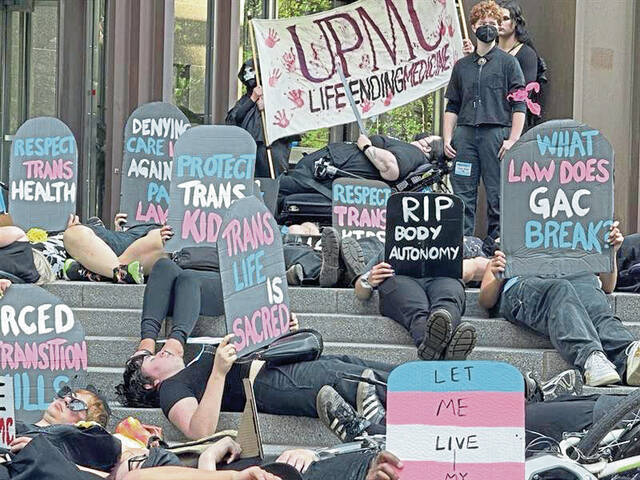https://triblive.com/local/feds-say-upmc-subpoena-is-part-of-broad-probe-into-gender-affirming-care-for-minors/
Feds say UPMC subpoena is part of broad probe into gender-affirming care for minors

Subpoenas for records of minors seeking gender-affirming care at hospitals across the country, including UPMC, are part of a nationwide investigation into off-label drug use and fraudulent billing, the federal government revealed last week in a court filing.
Filed in response to a motion to quash a subpoena at UPMC by four patients and their families, the court filing includes a declaration from a top Justice Department official explaining why the information being sought is necessary.
“This is a bona fide, high-priority and substantial national investigation of potential (federal Food, Drug and Cosmetic Act) violations in the provision of gender-related care for minors. Substantial government resources have been assigned to it,” wrote Lisa K. Hsiao, the acting director of the Justice Department’s consumer protection branch.
The legal brief calls it an investigation “of major public importance given its implications for the safety of minor patients.”
But the attorneys representing the UPMC patients who seek to block the subpoena said that’s not the government’s motivation at all.
“In April, the Trump DOJ set out to end gender-affirming care, doing that by threatening doctors with prosecution and intimidating patients,” Mimi McKenzie, the legal director at the Public Interest Law Center, said Friday. “You can draw a straight line from that memo directly to the subpoenas.”
A spokesperson for UPMC issued a statement on the matter Friday.
“It’s important to note there are no specific allegations of fraud against UPMC or UPMC Children’s,” the statement said.
Privacy rights
In July, the Justice Department sent more than 20 subpoenas to medical facilities and doctors nationwide who were performing “transgender medical procedures on children.”
They sought documents requesting names, dates of birth, Social Security numbers, as well as address and parent information for anyone prescribed puberty blockers or hormone therapy.
The subpoenas also sought diagnoses and assessments, as well as documents related to consent and parent authorization.
The government said it was worried about whether drugs, often used off-label, to treat gender dysphoria are safe — especially in children.
“The requested records bear directly on whether the practices surrounding distribution, promotion and dispensing of these drugs—unproven as safe or effective for treating gender dysphoria or any other mental disorder—may be violating federal law and endangering children,” the government wrote.
UPMC, which halted gender-affirming care for minors in June, Children’s Hospital of Philadelphia and Boston Children’s Hospital were among those subpoenaed.
In Philadelphia and Boston, the hospital systems moved to quash the subpoenas. In Boston, that effort was successful. In Philadelphia, the subpoena has been stayed.
In Pittsburgh, UPMC does not appear to have challenged the document request.
But last month, four patients and their families did, arguing that the information being sought is private, and that the government has no compelling reason to violate those privacy rights.
Who to trust?
The government argued that under federal law, only UPMC is able to challenge the subpoena, not the patients or their parents.
But the plaintiffs said federal law was amended in 2000 to “give citizens added protections against misuse of these subpoenas.”
Those amendments give them standing to fight the document request, they said.
Justice Department attorneys also said they routinely seek and obtain patient records during health care investigations, and there should be no concern about privacy because the law has explicit protections built in.
McKenzie, who represents the plaintiffs, said the Trump administration and his Justice Department have targeted transgender youth.
“It’s that they, themselves, can’t be trusted with this information,” McKenzie said of the government. “At the heart of this, the administration wants to end gender-affirming care. You can’t weaponize the DOJ to advance your political agenda.”
“Gender-affirming care is legal in Pennsylvania. So are the doctors’ off-label prescription, administration, and use of puberty blockers and cross-sex hormones for this care,” the plaintiffs wrote.
“And the fact that DOJ issued identical subpoenas at virtually the same time to at least 19 other medical institutions with slim to no evidence of any coherent violations of the (federal Food, Drug and Cosmetic Act) – including zero substantive allegations of even faint wrongdoing at UPMC – is further indication that this subpoena and the others lack substance and a proper purpose.”
Copyright ©2026— Trib Total Media, LLC (TribLIVE.com)
